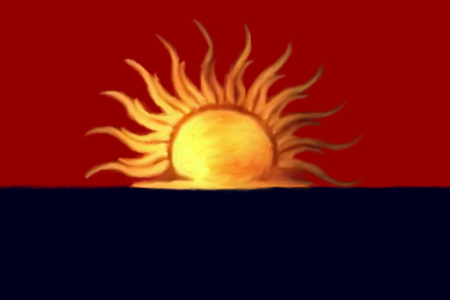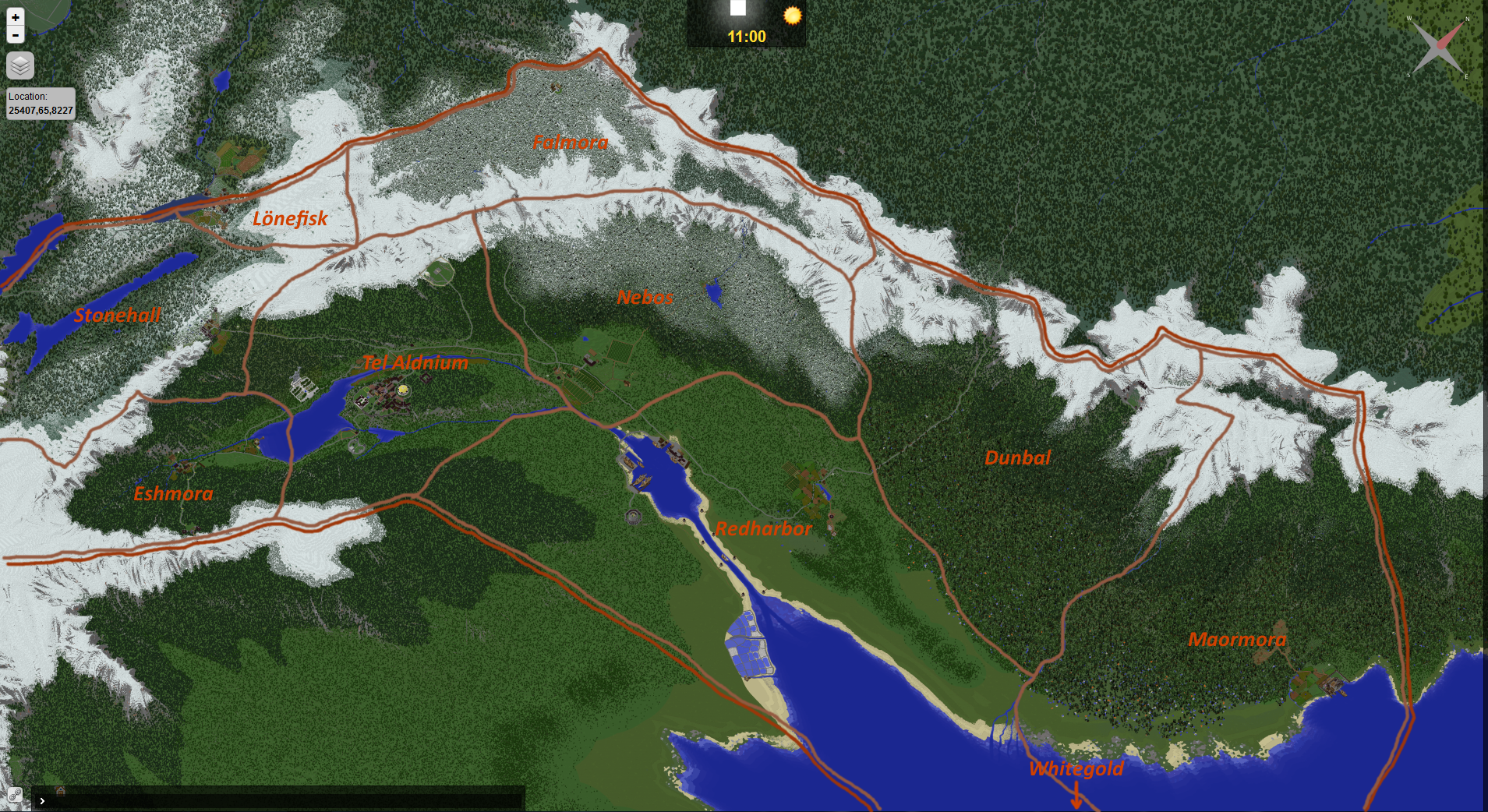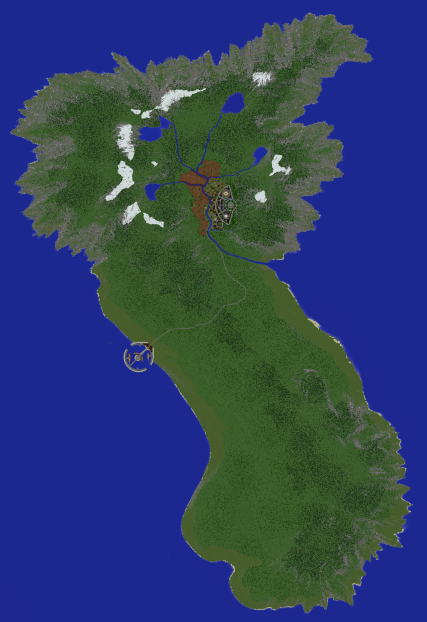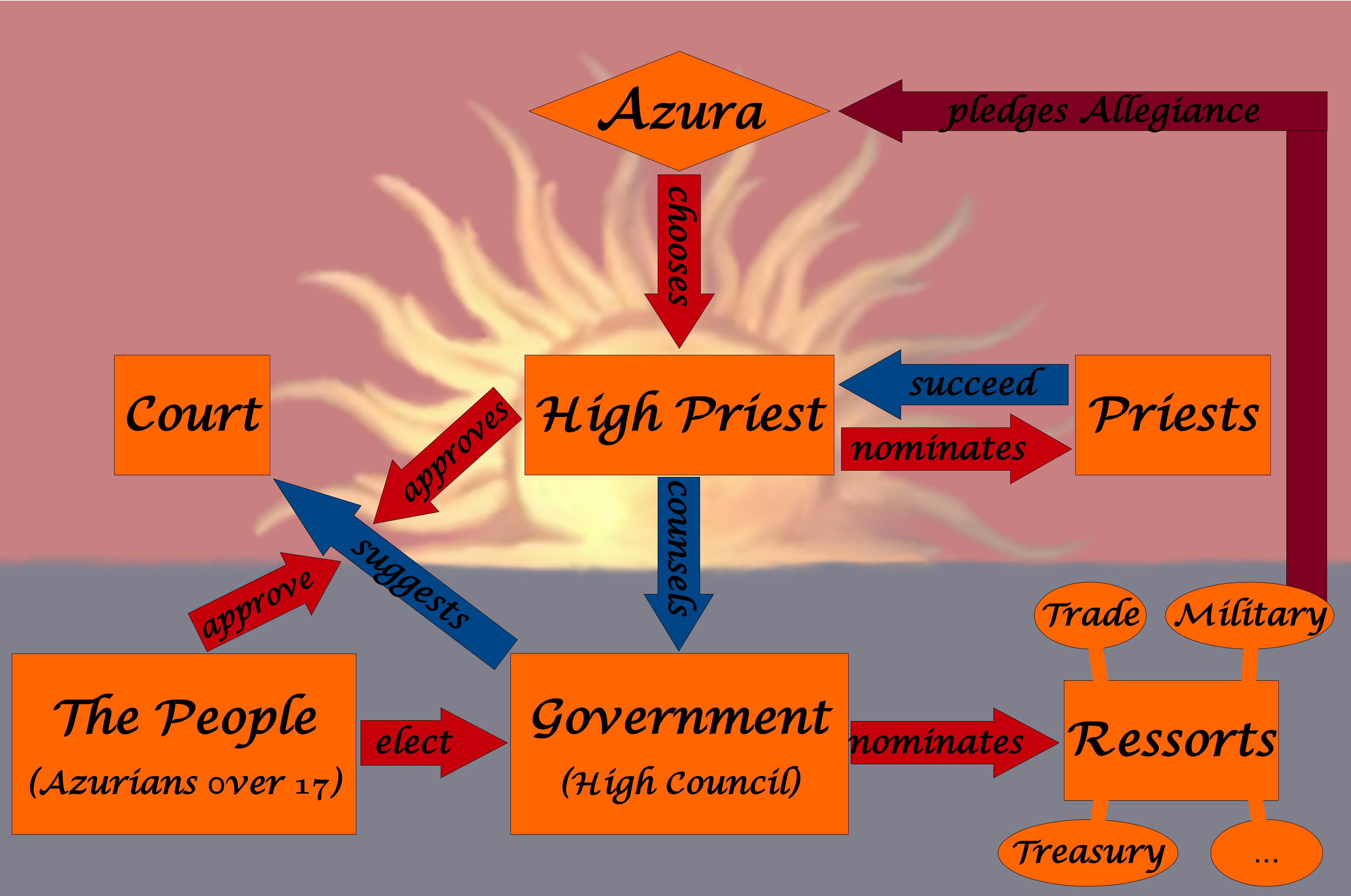Azurien: Difference between revisions
No edit summary |
No edit summary |
||
| Line 38: | Line 38: | ||
== Politics == | == Politics == | ||
[[File:Azurienpolitical.png|thumb|300px|right|Political system of Azurien]] | [[File:Azurienpolitical.png|thumb|300px|right|Political system of Azurien]] | ||
The free people of Azurien elect a council of wise men and women that rule for a minimal period of 3 years. The council has its place in [[Tel Aldnium]] in the Hall of the People. Every member is elected individually and everyone is part of the council until new candidates are up for their seat. The council, as the government, also nominates the ressorts, such as the ministry of trade or the department of the navy. Judges are suggested by the council and have to be approved by the people and the high priest. The military, usually organized by the ministry of defense and the department of the azurian navy, is not bound by an oath to the state or the government, but pledges allegiance to Azura. The high priest is chosen among the other priests by Azura and he chooses who becomes a priest. The high priest has also one seat at the council, he has no vote, but is a counsellor. The autonomous city of Lönefisk benefits from more freedom in trade and treasury regulation. <br /> | The free people of Azurien elect a council of wise men and women that rule for a minimal period of 3 years. The council has its place in [[Tel Aldnium]] in the Hall of the People. Every member is elected individually and everyone is part of the council until new candidates are up for their seat. The council, as the government, also nominates the ressorts, such as the ministry of trade or the department of the navy. Judges are suggested by the council and have to be approved by the people and the high priest. The military, usually organized by the ministry of defense and the department of the [[azurian navy]], is not bound by an oath to the state or the government, but pledges allegiance to Azura. The high priest is chosen among the other priests by Azura and he chooses who becomes a priest. The high priest has also one seat at the council, he has no vote, but is a counsellor. The autonomous city of Lönefisk benefits from more freedom in trade and treasury regulation. <br /> | ||
There are currently 77 seats in the council and every province gets a number of seats according to their relative population and one seat for the high priest for a total of 78 seats. The distribution is as follows: | There are currently 77 seats in the council and every province gets a number of seats according to their relative population and one seat for the high priest for a total of 78 seats. The distribution is as follows: | ||
Revision as of 11:28, 7 April 2017

Motto: We do not serve!
Azurien [azuʀiɪn], also called the Land of Dusk and Dawn, is a decentralized unitary state with a parliamentary monarchy in eastern Hasperia. Its capital is Tel Aldnium and its official religion is Azuran.
History
Once there was another state called Azurien, where the first settlers found the giant Statue of Azura. Unfortunately a cataclysmic event, probably caused by a devastating eruption of the volcano, happened and it was destroyed. Few Azuriens could escape, but found themselves soon caught into slavery. It took nearly five decades until the rebellion happened. Azuriens were finally free again, and founded their new Azurien.
Geography
Azurien reaches from the peak of Mount Heightlimit in the south to the great wilderness in the north and from the isle of Whitegold in the east to the city of Lönefisk at the border to Lonien in the west.
It is divided into the 10 provinces:


| Province | Location | Translation |
|---|---|---|
| Tel Aldnium | The capital, in the centre of the heartlands | "Tower of the highest God" |
| Eshmora | In the south | "High forest" |
| Stonehall | In the southwest | |
| The autonomous city of Lönefisk | In the west | |
| Nebos | North of Tel Aldnium | "Never green" |
| Falmora | In the northwest | "White forest" |
| Dunbal | In the north | "Dark rock" |
| Redharbor | In the east | |
| Maormora | In the northeast | "Sea forest" |
| Whitegold | The island in the east across the sea |
Politics

The free people of Azurien elect a council of wise men and women that rule for a minimal period of 3 years. The council has its place in Tel Aldnium in the Hall of the People. Every member is elected individually and everyone is part of the council until new candidates are up for their seat. The council, as the government, also nominates the ressorts, such as the ministry of trade or the department of the navy. Judges are suggested by the council and have to be approved by the people and the high priest. The military, usually organized by the ministry of defense and the department of the azurian navy, is not bound by an oath to the state or the government, but pledges allegiance to Azura. The high priest is chosen among the other priests by Azura and he chooses who becomes a priest. The high priest has also one seat at the council, he has no vote, but is a counsellor. The autonomous city of Lönefisk benefits from more freedom in trade and treasury regulation.
There are currently 77 seats in the council and every province gets a number of seats according to their relative population and one seat for the high priest for a total of 78 seats. The distribution is as follows:
| Province | Number of Seats |
|---|---|
| Tel Aldnium | 18 |
| Eshmora | 7 |
| Stonehall | 3 |
| The autonomous city of Lönefisk | 5 |
| Nebos | 9 |
| Falmora | 2 |
| Dunbal | 1 |
| Redharbor | 8 |
| Maormora | 6 |
| Whitegold | 18 |
Demographics
A majority of the people living in Azurien consider themselves as azurian. In the capital Tel Aldnium lives a small community of lonians in a townpart called Little Vineta. The autonomous city of Lönefisk is inhabited almost half by azurians and lonians. Other groups are from Greifenhausen and lately refugees from the Silvetian civil war.
Azurians are a generally tall people with an average height of men at 1,85m and women of 1,75m. Life expactancy with 45 years is due to the hard work in the agriculture and the mining industry.
Official state religion is Azuran. Over 80% of the people visit the temples or wayshrines on a regular bases. Other religions are tolerated and mostly conducted by foreigners.
Economy
The economy of Azurien is dominated by the extraction of ressources and trade of commodities. In addition to that Azurien is known for livestock production and the production of alcoholic beverages. Notable ressources are gemstones and rare metals, that are extracted from the deeps of the southern mountain ranges in the province of Eshmora. Azurian lapidaries then create jewellery and ornaments for the temples or foreign customers. In the northeastern lands south of the great wilderness in the province of Maormora is the wood industry. The dense forests provide excellent materials and are usually floated to the other provinces. The heartlands are home to wine press houses, mead producers and a donkey breeder. Goods are transported to the harbor of Redharbor to ship them to foreign lands. At the province of Redharbor are also the great saltfields where one of azurians most important good is extracted. Important trade partners include: Lonien, from which manufactured good are imported; Greifenhausen, to import beer; Montebianco, as tradeagreement; Neogaranid Empire, to exchange salt for spices and dyes.